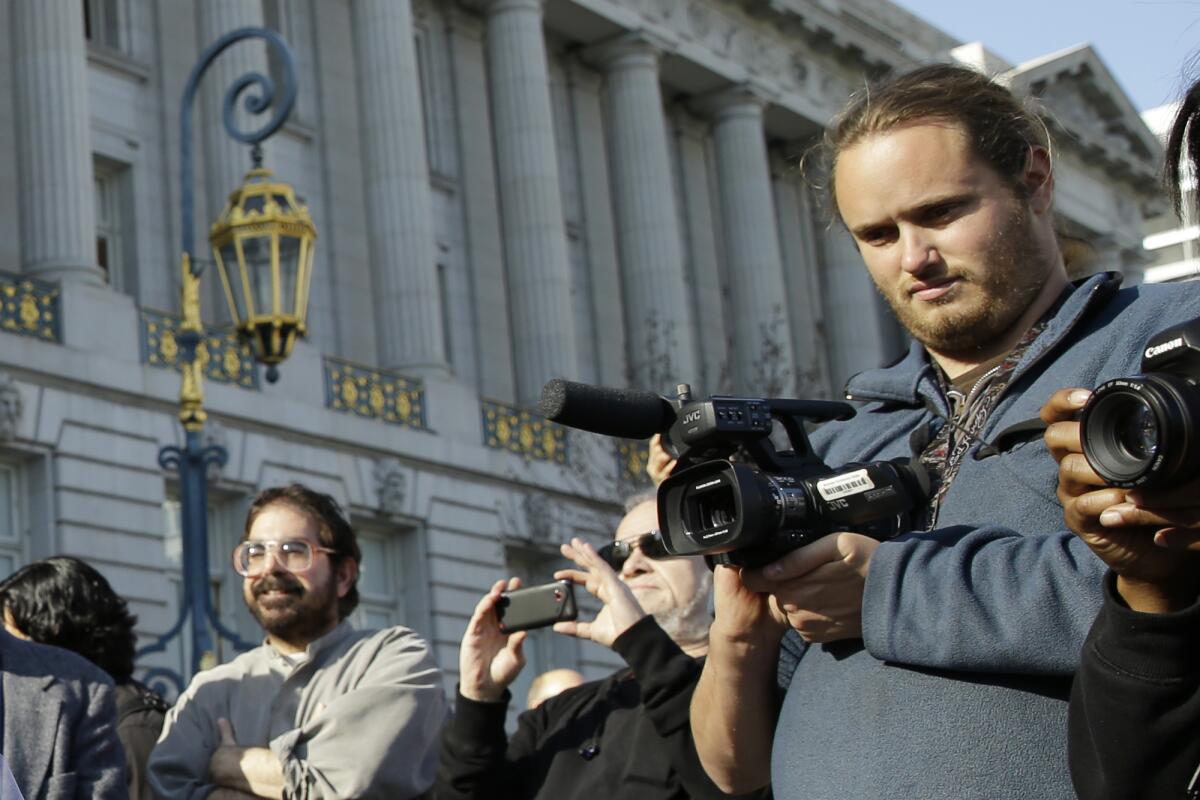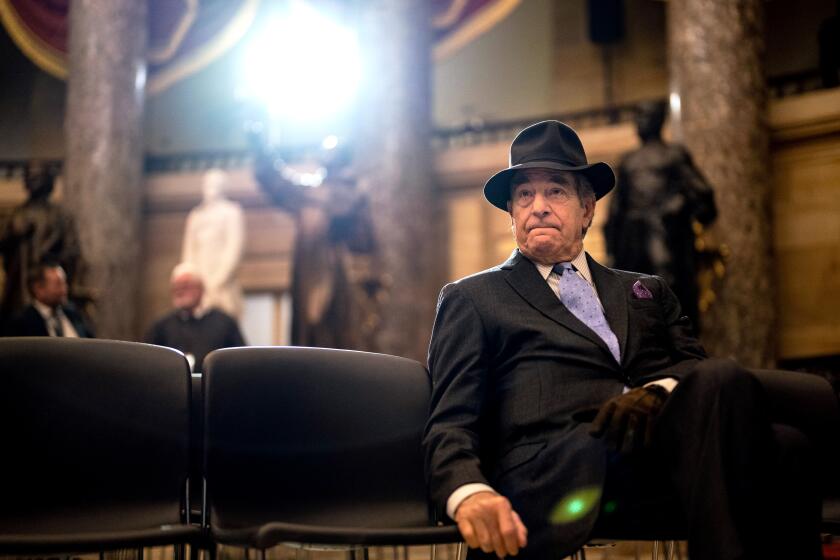Man charged in Paul Pelosi attack details descent into conspiracy theories during federal trial

SAN FRANCISCO — David DePape, the man accused of attempting to kidnap former U.S. House Speaker Nancy Pelosi and attacking her husband last year after breaking into the couple’s home, detailed his descent into political extremism and belief in conspiracy theories during his testimony Tuesday in the federal trial against him.
DePape, 43, explained that long before he broke into the Pelosis’ San Francisco home in the early morning of Oct. 28, 2022, with plans to get the lawmaker to fess up to corruption within the Democratic Party, he considered himself to be left-leaning politically. He thought Sept. 11 was an “inside job” during former President George W. Bush’s tenure in the White House, he said, and at one point he maintained a “very strong anti-Trump bias,” believing the former president was a puppet of the ruling class and Wall Street.
That all changed as DePape spent entire days on the internet watching YouTube and listening to right-leaning political podcasts while playing video games in a garage he called home in Richmond, north of Oakland. His favorite podcasters included right-wing pundit Tim Pool and James Lindsay, a conservative influencer that the nonprofit advocacy organization Southern Poverty Law Center describes as a promoter of anti-LGBTQ+ rhetoric and “conspiracy theories about the supposed communist takeover of the world.”
DePape explained that his first foray into America’s “culture war” was through Gamergate, a right-wing harassment campaign against women and journalists in the gaming industry. From there, he turned his attention to the mainstream media’s coverage of former President Trump and what he perceived as corruption in the Democratic Party.
The federal trial of David DePape, the man accused of attacking Paul Pelosi and attempting to kidnap Rep. Nancy Pelosi, begins Thursday in San Francisco.
“Everything was a lie about Trump coming from the press,” he said.
His hourlong testimony wandered across a range of conspiracy theories, none of which were supported by evidence. He mentioned Russiagate, a belief that the investigation into Russian interference in the election was a “deep state” attempt to destroy the Trump presidency. He brought up the debunked sex-trafficking conspiracy known as Pizzagate and said that “the ruling class, the cabal, the people who control us and run the media” are killing the “tree of liberty.”
It was while listening to a right-wing podcast that DePape learned of an unidentified woman listed in court records as “Target 1” and described during the trial as an anthropologist and professor of women and gender studies at the University of Michigan. Her work has prompted debate among feminists and the LGBTQ+ community, specifically around age-of-consent laws, and DePape said he believed the professor’s research was promoting pedophilia and the molestation of children.
He planned to go to the professor’s San Francisco home that October morning, he testified, but said he considered the Pelosis’ house a more accessible starting point. He planned to question the lawmaker about QAnon conspiracy theories and charges of corruption that he alleged involved the Democratic Party and various elected officials and public figures.
If Nancy Pelosi lied to him, DePape said, he planned to “break her kneecaps.” He also hoped the lawmaker could help lure out Target 1 so he could “expose the truth.” After that, he planned to focus on Gov. Gavin Newsom, who had recently signed a gun control bill.
A long-simmering schism among vocal members of the gaming community has led to death threats and harassment of game designers and writers, many of them women.
“Someone trampling 2nd Amendment rights needed to make the list,” DePape said.
DePape said the figures that caught his attention extended beyond California and across the country to include actor Tom Hanks, Rep. Adam B. Schiff (D-Burbank), billionaire philanthropist George Soros and Hunter Biden, the president’s son — all people he believed were contributing to corruption in the Democratic Party or had engaged in child abuse and human trafficking. Such conspiracies are not supported by facts.
DePape said he wanted to get Biden “to expose the corruption against his father.” In an unclear and ambiguous final goal, he’d get everyone on the list to admit to their crimes so the president could pardon them all.
The plan was thwarted after he encountered a sleeping Paul Pelosi in the couple’s home.
DePape’s testimony largely matched the harrowing details Pelosi provided in court on Monday, when he explained the fear he felt in the minutes between the break-in, his 911 call and when police responded to the scene shortly after 2:30 a.m.
Pelosi told DePape his wife was in Washington and wouldn’t be home for days. DePape said he would wait for her and tie Pelosi up so he could get some sleep in the meantime.
DePape said that besides the 911 call that Pelosi made, the two men were getting along fine and that he didn’t plan to attack the 82-year-old man.
“I didn’t want this to escalate into something where he would get hurt,” he said, adding that at one point he gave Pelosi a “squeeze on the shoulder, just to be reassuring.”
Paul Pelosi, husband of former U.S. House Speaker Nancy Pelosi, offered chilling new details in federal court on Monday of the night he was bludgeoned with a hammer.
DePape faces up to a combined 50 years in prison if convicted of the two federal charges. But the case is far from straightforward.
The conviction is contingent on prosecutors being able to prove beyond a reasonable doubt that DePape intended to kidnap Speaker Pelosi “on account of or during the performance of her official duties.” Prosecutors also have to demonstrate that the assault was done in an effort to “impede, intimidate or interfere” or in retaliation for the lawmaker’s official duties.
Prosecutors have focused their case on comments DePape made in police body-camera footage and in interviews after the attack. He told Lt. Carla Hurley that he had plans to break Speaker Pelosi’s kneecaps so she would have to wheel herself into Congress, where other lawmakers could see the consequences of being one of the “most evil” people on the planet. He told a reporter in a recorded call this year that he was regretful he was unsuccessful in his mission and that he “didn’t get more of them.”
Despite public questions over DePape’s mental capacity, his attorneys have not raised that argument during trial.
Instead, they focused their case on DePape’s conspiracies, alleging he was driven not to attack Paul Pelosi or kidnap his wife, but to put an end to a broader scheme of corruption and other crimes by the Democratic Party and its cronies.
“Members of the jury, many of us do not believe any of that. We think it’s bogus,” federal public defender Jodi Linker told the jury Thursday. “You may think it is all lies, harmful lies that are in fact destroying the country. ... But the evidence in this trial will show that Mr. DePape believes these things, he believes them with every ounce of his being. He believes them firmly and completely, and it is these beliefs, wholly unrelated to Nancy Pelosi’s official duties to Congress, that propelled him to act that night.”
Attorneys for the man accused of attempting to kidnap Nancy Pelosi and assaulting her husband said he believed in conspiracies, but was not guilty of the federal crimes.
On the stand, DePape rejected the idea that he traveled to the Pelosi home for kidnapping, and said he would have broken Speaker Pelosi’s kneecaps only if she lied to him.
“The choice is on her,” he said. “There’s an alternate path to resolution that doesn’t involve violence.”
He also disputed the argument that he bludgeoned Paul Pelosi with a hammer because of his wife’s role in Congress. He said he reacted after police arrived at the house “because my plan was basically ruined.”
“When he was like on the ground breathing, I was really scared for his life,” he said. “And later in the hospital, I felt really bad for him, because we kind of had a really good rapport and things were going really good until the very last second.”
Attorneys are expected to make closing arguments in the case Wednesday.
More to Read
Sign up for Essential California
The most important California stories and recommendations in your inbox every morning.
You may occasionally receive promotional content from the Los Angeles Times.














